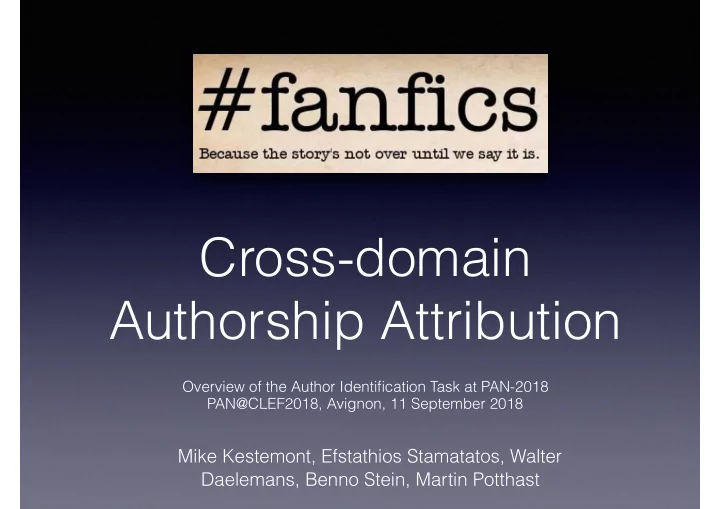

Cross-domain Authorship Attribution Overview of the Author Identification Task at PAN-2018 PAN@CLEF2018, Avignon, 11 September 2018 Mike Kestemont, Efstathios Stamatatos, Walter Daelemans, Benno Stein, Martin Potthast
Authorship attribution • Closed-set: assign anonymous text to one author from set of candidate authors (classification problem) • Importance and difficulty of benchmarking: need for • Large but varied corpora • Accessible data (free of rights) • Control over topic and genre (domain) • Multilingual, yet comparable datasets
What is fan fiction? • Fiction produced by non-professional authors • that explicitly builds on previously published fiction (characters, themes, settings, etc.)
Canon Fandom
Attractive? Characteristic Advantage Online, open platforms Digitally accessible Unmediated No editorial interference Explicit about canon Rich metadata Global phenomenon Language-independent
Balanced cross-domain design All test texts, across 5 languages (!), from target fandom (Harry Potter) not represented in the training data. Each author: 7+ training texts
Submissions Compared to a SVM char 3gram baseline
Effect of number of authors
Significance
Model criticism Dominance of ngrams (TF-IDF), instance-based, SVMs
Post-hoc analyses More varied training data helps (cf. Sapkota 2014) — influence of original author is not a major factor
Observations • Fanfiction validated: feasible, but not easy, so room for progress • (Stylistic) influence of canon author not an issue? Focus on (semantic) domain • Some stagnation in the field, both in feature extraction and classification • (Where is deep learning? Cf. Bagnall@PAN2016)
Stay tuned • Next year at PAN 2019 (Lugano) • Focus on open-set attribution in fan fiction • No longer a single target fandom: more “adversarial” set up • Less restricted design: larger, more complex problems to push innovation
References • Douglas Bagnall. Authorship Clustering Using Multi-headed Recurrent Neural Networks—Notebook for PAN at CLEF 2016. • Kestemont at al. Overview of the Author Identification Task at PAN-2018 Cross-domain Authorship Attribution and Style Change Detection. PAN 2018. • Hellekson, K., Busse, K. (eds.): The Fan Fiction Studies Reader. University of Iowa Press (2014). • Sapkota, U. et al. Not all character n-grams are created equal: A study in authorship attribution. COLING 2014. • Stamatatos, E.: A Survey of Modern Authorship Attribution Methods. Journal of the American Society for Information Science and Technology 60, 538–556 (2009)
Recommend
More recommend